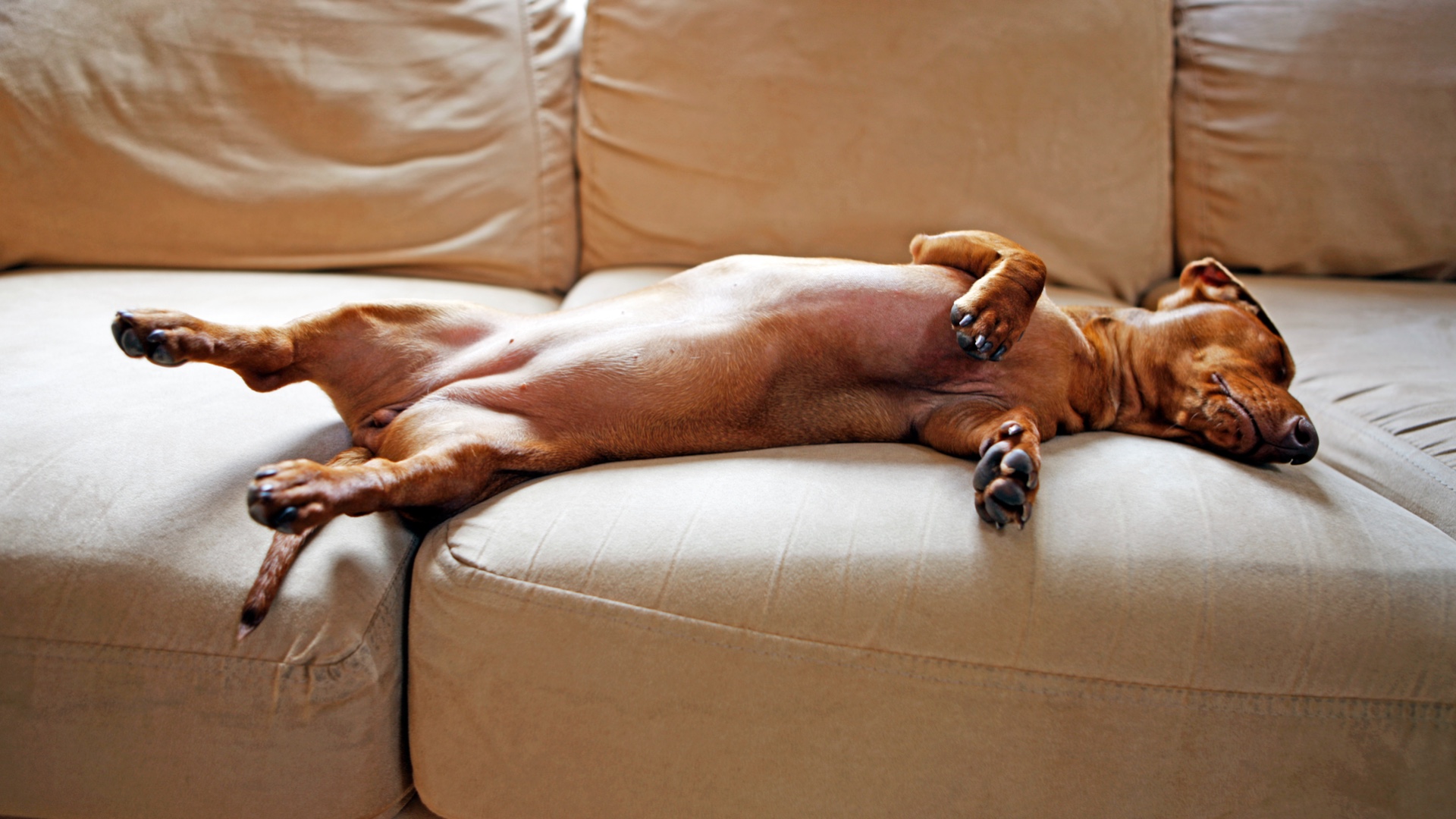Why is my dog sleep barking?
Wondering whether your dog’s sleep barking is a cause for concern or just cute noises they make while packing in the ZZZs? We asked an expert to find out.

Most dog owners might not expect to hear their dog sleep barking, especially when they’re tucked up in one of the best dog beds or one of the best large dog beds. They are meant to be asleep, feeling safe and cozy right?
Dogs have somewhat of an idyllic life — they sleep and nap as and when they want to and for as long as they want or need to. They are fed healthy nutritious food and get to go on fun walks, play and have a cuddle time. As a daily routine, it shapes up pretty well!
Whilst dogs have slightly different sleeping patterns and their routines vary from breed to breed, some types of dogs are more energetic than others. For example, most exhibit certain behaviors and vocalizations during their sleep at some point in their lives.
This may not be every time they catch some ZZZs but you will have likely experienced seeing them perform running and twitching movements during their naps. Or heard them barking, howling, or making strange quivering noises only to rush to them concerned and discover them to be soundly asleep in the land of nod.
While there are plenty of funny things dogs do, barking in their sleep is often a mystery. So what is going on? What’s all the noise about? Here’s what experts say and here’s what the science says.
What does sleep barking mean?
Sleep barking refers to your dog making either alarming or cute noises whilst they are fully asleep. This vocalization can take on the format of short sharp barks, high pitched sounds, mini howls or whimpers. What we're talking about here are vocalizations rather than dogs just twitching in their sleep. For the most part, your dog is experiencing what we believe to be dreaming.
As we well know from personal experiences, these images, events and stories can be strange, amazing, scary and everything in between and they occur in dogs, most likely, during the same point within the sleep cycle as they do in humans.
PetsRadar Newsletter
Get the best advice, tips and top tech for your beloved Pets
Whilst your dog is sleeping and cruising through the stages of sleep, they are experiencing both Rapid Eye Movement (REM) sleep and Non Rapid Eye Movement (NREM) sleep. You may notice your dog's eyes are slightly open too (you can find more on that in our feature on; Why do dogs sleep with eyes open?)
VCA Animal Hospitals report before NREM sleep, dogs go through a period where the brain is quieter and appears rested, however, their muscle tone is still quite active and they can be easily woken or disturbed during this time. Following this portion of sleep, they then fall into a more drowsy and fully asleep state whereby the muscle tone and body are relaxed but the mind becomes more active. This deeper fully asleep stage of the cycle is known as REM sleep. During this REM cycle, your dog may dream or have a nightmare and exhibit sleep dog barking.
Please be aware however… should these limb movements become more violent and/or the vocalization turns louder or your dog's normal pattern changes in any way, seek advice and a check up from your veterinarian as it has been discovered that canines, as with humans, can suffer from a condition called REM Sleep Behavior Disorder which will require professional attention.
If your dog won't stop barking when they're awake, this vet's guide can help.
Dog howling in sleep: should you wake your dog up?
It is not advisable to wake a sleeping dog whether they are sleep barking or not. Even if you believe them to be having a nightmare, leave them and let them work through it. Dogs, like all animals and humans, need proper rest and sleep to allow their minds to recharge and their bodies to recuperate, repair and digest. Waking your canine friend, whether on purpose or accidentally, may well likely result in your dog perceiving the act as a threat. When this occurs it startles them and they can react to it with an attack, bite, bark or scratch. Many children have and are unfortunately bitten by dogs due to them waking the dog as they sleep or rest. Expert dog trainer and canine social behaviorist David Evans said “dogs are very likely to be startled or grumpy if woken while sleeping and dreaming and I’ve met many owners whose dog turned aggressive towards them when they have done so.”
How much sleep do dogs need by age?
Adults: Most adult dogs sleep somewhere between 12-14 hours a day mostly during the night, not the day and they average around 11 hours per 24 hours similar to puppies.
Although most of their sleep is nocturnal they do also take naps for good proportions of the day too.
Seniors: A dog is classed as a senior from eight years old (or five years old if they are a large breed). They will still sleep for the same amount of hours as an adult dog or maybe slightly more but they tend to wake less during the night, sleep in the mornings and are likely to take more day naps, as discovered by research carried out by The Journal of Veterinary Behavior on characterizing behavioral sleep.
Looking for more on dog sleep? Find out exactly how much sleep does a puppy need and we asked a vet, why do dogs sleep so much? Here's the answer to 'Why does my dog lay on top of me?' Want to help your pup sleep through the night? Try the best puppy sleep aids.
Social Behavior Dog Training is run by David Evans who has worked professionally with dogs and their owners for the last 35 years. He is a qualified Police Dog Handler and qualified Guide Dogs For The Blind Trainer. During his time in the Royal Air Force he spent two years as a member of the world famous RAF Police Dog Demonstration Team. Has worked for the RSPCA asAnimal Home Manager and Local Authority encouraging responsible dog ownership. Was one of the founding members of the Association of Pet Dog Trainers and has been called upon as an Expert Witness in court where dogs were the center of controversy.
Annaliese qualified as a veterinary nurse from Edinburgh and went on to attain a diploma in advanced veterinary nursing in surgery from London. Throughout this time, she worked in both small and mixed veterinary practices and gained head nurse status. Responsible for training other veterinary nurses she also ran the nursing department, nurse clinics, and patient care protocols.
She has looked after 1,000s of patients and owners and created new higher standard nursing regimes, whilst specializing in surgery and anesthesia. After being asked to co-author multiple veterinary nursing textbooks, Annaliese continued to write for further mainstream publications in the UK and USA and after twenty-plus years in both the veterinary and pet care professions, she hung up her scrub suit and now writes full-time.

